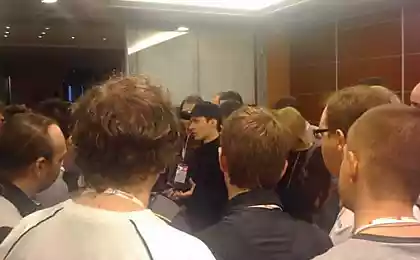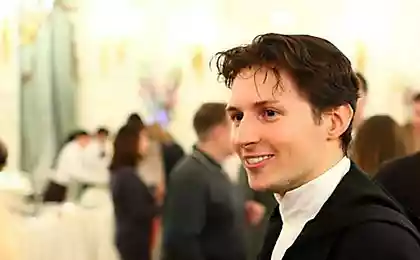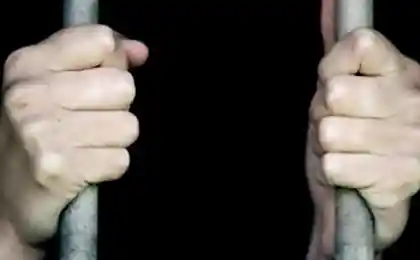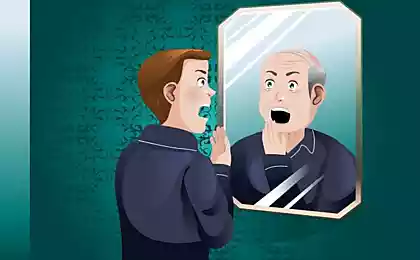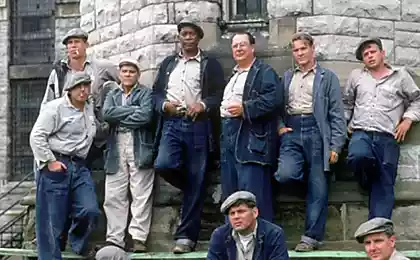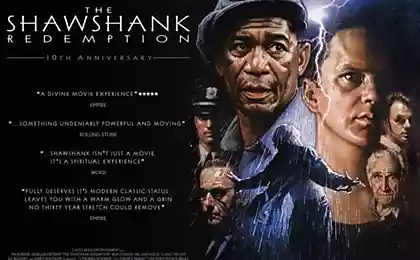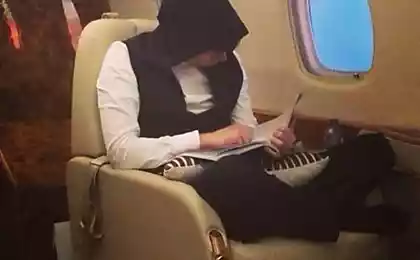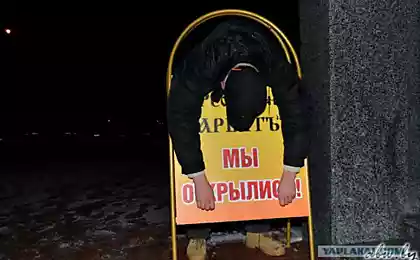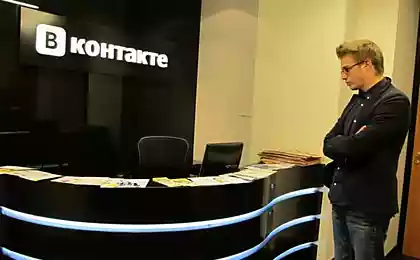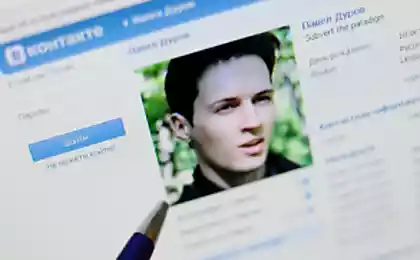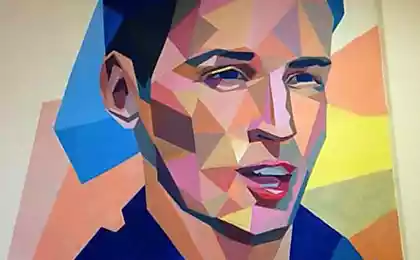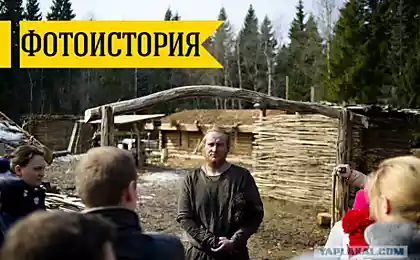762
Pavel Durov: the Shawshank redemption
Six million two hundred eighty two thousand five hundred seventy two
Durov in the Mashable office. New York, may 2015
Now the actor looks calm. I think he relishes the taste of newfound freedom:
"Now I can live and work where you want, and decide their future."
The story of a man whose loyalty to the principles did not appreciate the native state.
Recently on a rooftop in Brooklyn at a barbecue going motley company. On the one hand in a pink Polo shirt, flipping burgers for hamburgers stood Ashot Gabrelyanov, who has long been supportive of the Russian President. Next at a table, sipping a cocktail, is located a former activist Masha Drokova in huge dark glasses — even though overhead the gray sky.
Between them — Pavel Durov, founder and former head of the most popular Russian social network. Here he stands in his trademark black suit and baseball cap. Apparently resigned to his new life in exile, he said: "We are far from Moscow."
Durov way to this new York roof began four years ago. In December 2011 he was home alone in his St. Petersburg apartment, when suddenly someone knocked on the door, armed men in camouflage. Looking out the window, he saw that I was surrounded by. The stairs were heard demands to immediately open the door.
A few days earlier Durov, the founder of social network Vkontakte has refused to block at the request of the FSB page political opposition groups established to coordinate anti-government rallies in Moscow.
The Kremlin first pushed for the lock on a page of one particular activist Alexei Navalny, who was known for exposing in his blog corruption schemes and the luxurious lives of senior officials.
Durov didn't just refused to follow the instructions of law enforcement bodies and to remove the Bulk page, but posted on Twitter mocking a photo of the dog in the hood, showing the language.
Defiance Durov did not go unnoticed. Come armed with machine guns FSB agents. Durov refused to let them and, to his surprise, an hour later I discovered that they were gone. However, the incident scared the young entrepreneur. Recently in a rare interview given in new York, the actor confessed:
"It was really scary. First came up with the idea that we need to think about the future — the future of my country and my company."
This episode marked the beginning of a nearly four-year struggle against the Russian authorities, which the actor eventually lost. In 2014, the man once known as the Russian Zuckerberg, was forced to cede control of the company he founded oligarchs loyal to Putin. Soon after, he left Russia.
Now 30-year-old businessman living in exile, continuously roaming the world and thinking about the choice.
How did Vkontakte Social network Vkontakte in Russia on a monthly basis is more than 69 million people. Share Facebook and Twitter in this market is very small.
Durov opened the project in 2006, as a student of the Philological faculty of St. Petersburg state University. The interface reminds Vkontakte, Facebook, first Durov was even accused that he copied the American social network with which he was acquainted business partner Vyacheslav Mirilashvili, who studied at tufts University. At that time Facebook was still only available to users with the email address of the American University.
Coding Facebook friends drew brother Nikolai Durov, a mathematician and an outstanding programmer. The network quickly gained popularity as a means of exchange any kind of information, in particular, pirate movies and music — it was possible due to the fact that in Russia is not very strictly enforce copyright law.
Durov denies like doing my network in the image and likeness of Facebook and says it's "a place of complete freedom where you can disseminate any information in any form".
VKontakte really liked the first user and within a year, the portal has become most popular social network in the country and one of the largest repositories of content in Europe. Durov in 22 years he became a multimillionaire and a celebrity and seems to be enjoying this role.
White skin, straight black hair, black clothes image Durov reminiscent of Neo from the Matrix. Due to the extravagant manner of behavior and appearance of the bully, the handsome actor quickly became a regular topic of gossip in Moscow and St. Petersburg.
However, not all his antics were met with approval.
In 2012 he launched paper airplanes from five thousandth bills from the box office of his company in St. Petersburg. At the bottom of Nevsky Prospekt, a fight broke out over money. Many felt it was a fool's arrogance.
On Victory Day, when Russians celebrate the victory over Nazism, the film ironically wrote: "Stalin, Hitler defended the right to punish the population of the USSR", and has again incurred the wrath of many Russians. But the young entrepreneur is don't seem to care. His only motto is "down with boredom."
Vladimir Putin, who called the collapse of the Soviet Union "the greatest geopolitical catastrophe of the century", took office in 2000, promised to restore the greatness of Russia and its status as a world superpower.
He had little interest in technology and the Internet, considering that the network is "half pornography".
For many years, the state did not pay attention to what is happening in the virtual space, and, according to Durov, "it was the Golden age for the Russian Internet".
But by 2011, when Moscow began protests against rigged elections, the Kremlin realized the importance of the Internet as a social tool.
Vladislav Surkov, the "gray cardinal" in charge of Putin's team for media strategy at first seemed to be treated Durova friendly. In 2009-2011 they had several meetings at the headquarters of Facebook.
Durov says that during the first meeting, Surkov was interested in his opinion on how Russia to make technological breakthrough and that may become the new big thing on the Internet. Two years later, during the last meeting, the situation was quite different — Surkov was tense and closed.
Behind the Kremlin walls began to think about how to control the Russian Internet and people like Durov. One of the representatives of the Kremlin at the time put it this way: "the Opinion of the blogosphere is having a growing impact on the most serious political, economic and social processes. Conducted information war aimed at undermining citizens ' trust in the state."
In late 2011, the Kremlin demanded that Vkontakte to block the Bulk of the page, Durov said his famous tweet with the dog. When one of the pages of the opposition was blocked due to the fact that she has signed more than 100 thousand people, Durov changed the algorithm to allow everyone to follow the Bulk materials.
Today, Durov said that he did it for business reasons. Say, if he had fulfilled the state order, users Vkontakte went out of his social network.
Andrei Soldatov, the editor of the site about the Russian intelligence service Agentura.ru agrees that the actor was not politically motivated.
"He wasn't going to play a role in politics, but unwittingly involved in political struggle".
Kevin Rothrock, the chief editor of Runet Echo, a member non-profit network of citizen journalism Global Voices Online believes that by ignoring the requests of the government, the film drew the attention of the Kremlin: "we Can say that the actor was asking for their reaction".
Anyway, over the next three years, Russian lawmakers have adopted a series of measures aimed at increasing control over the Internet. And although political protests subsided in early 2012, the film was already in sight of law enforcement.
In the beginning of 2013 in mass media there was a wave of negative information about the entrepreneur, that looked like a well-orchestrated attack. It all began with the publication in Russian media of allegedly hacked emails from the correspondence between Durov and Surkov, which showed like Vkontakte has long been cooperating with the FSB that Paul categorically denies.
Then on April 5 the Prosecutor's office opened a criminal case on a police officer. It was alleged that the driver of the white Mercedes, was Vice-President of Vkontakte Ilya Perekopsky, was Durov. He recalls: "at First I thought it was a joke. This was an outright lie."
But soon, the case was transferred to the jurisdiction of the Investigative Committee. Less than two weeks later, investigators showed up at the singer House with a search warrant and seized company documents.
Durov says he's only in this moment began to understand the political background of the case, and it "came the Kremlin."
Durov and oil the next morning after a search in the headquarters of the actor read in the news that the original investors of the company, Vyacheslav Mirilashvili and Lev Leviev have sold their 48% stake in the company (when they were worth about 2 billion dollars) the company United Capital Partners (UCP), an investment Fund, known for close ties with the Kremlin. Up to this point, the UCP have never invested in technology companies; his field was Finance, and oil and gas extraction, and oil refining.
The deal, as it turned out, were organized by Igor Sechin, head of Russian oil giant Rosneft. Durov says that the sale was illegal, since, according to the company's Charter, existing shareholders have pre-emptive right of purchase of shares owned by each other, and he was no ransom offered.
Nafisa Nasyrova, the press Secretary of UCP, said in an email that the political motives of the deal were not.
"We are a private investment company and our investments have nothing to do with politics, the Kremlin or Mr Sechin". Durov was afraid that him will detain, and left Saint Petersburg, fly, first in Venice and then in new York.
For several months he did not appear in Russia and returned only in June 2013, when the criminal case became the administrative and possible jail time — fine.
He lost control of Vkontakte, but his experience with the Russian authorities superimposed the arrival in Moscow of Edward Snowden, the whistleblower of NSA secrets. The entrepreneur's new idea: app to exchange encrypted messages called Telegram. He says:
"We understand that security is a problem not only in Russia, it is global".
January 20, 2014 in Moscow there were rumors that Durov resigned from the post of the General Director Vkontakte. The company denied it, but four days later, Durov confirmed that he had sold his 12 percent stake in the company Ivan Taurine, General Director of mobile operator MegaFon. The mobile operator in turn is part of USM Holdings, led by billionaire Alisher Usmanov, the largest shareholder of the Internet company Mail.Ru. Durov remains CEO of Vkontakte, but the company was fully controlled by businessmen loyal to Putin.
In February, the actor shared with his 6 million subscribers video in support of Pro-Western Ukrainian demonstrators. Shortly thereafter, the Kremlin requested data on Ukrainian users Vkontakte post similar messages.
April 1 Durov wrote on his Vkontakte blog that he was leaving the company. Two days later he tried to claim that it was an April fool's joke, but three weeks later the company officially announced his resignation. Durov is looking at it slightly differently.
"Up to this moment I do not have any real powers, so it's time to go."
And again he flew from Russia, this time not going back.
Its application for secure instant messaging, Telegram is free and shows no ads. He has about 50 million users, and most of them are located outside of Russia, but we know that they use some Russian officials, including Dmitry Peskov, Putin's press Secretary.
The Electronic Frontier Foundation, American group on the protection of digital rights, assessed the safety of "secret chats" Telegram to seven points out of seven.
Durov claims that the application does not have external investors — and never will be. He learned his lesson.
Meanwhile, Russian authorities continue their attack on freedom in the Internet. The legislature passed an act that required companies that work with Russian users to store their personal data inside the country. It was also reported about the possibility of creating a "circuit breaker" that disables the country from the world wide web in case of an emergency.
In December last year, Russian authorities demanded that Facebook lock page associated with opposition activist Alexei Navalny — and the American company complied with the request of the government, blocking access to users from Russia. Durov wrote on Twitter: "Facebook has no guts and no principles."
He says he will never fulfill such a requirement, from whatever government it comes from.published
P. S. And remember, just changing your mind — together we change the world! ©
Source: insider.pro/EN/article/30074/
Durov in the Mashable office. New York, may 2015
Now the actor looks calm. I think he relishes the taste of newfound freedom:
"Now I can live and work where you want, and decide their future."
The story of a man whose loyalty to the principles did not appreciate the native state.
Recently on a rooftop in Brooklyn at a barbecue going motley company. On the one hand in a pink Polo shirt, flipping burgers for hamburgers stood Ashot Gabrelyanov, who has long been supportive of the Russian President. Next at a table, sipping a cocktail, is located a former activist Masha Drokova in huge dark glasses — even though overhead the gray sky.
Between them — Pavel Durov, founder and former head of the most popular Russian social network. Here he stands in his trademark black suit and baseball cap. Apparently resigned to his new life in exile, he said: "We are far from Moscow."
Durov way to this new York roof began four years ago. In December 2011 he was home alone in his St. Petersburg apartment, when suddenly someone knocked on the door, armed men in camouflage. Looking out the window, he saw that I was surrounded by. The stairs were heard demands to immediately open the door.
A few days earlier Durov, the founder of social network Vkontakte has refused to block at the request of the FSB page political opposition groups established to coordinate anti-government rallies in Moscow.
The Kremlin first pushed for the lock on a page of one particular activist Alexei Navalny, who was known for exposing in his blog corruption schemes and the luxurious lives of senior officials.
Durov didn't just refused to follow the instructions of law enforcement bodies and to remove the Bulk page, but posted on Twitter mocking a photo of the dog in the hood, showing the language.
Defiance Durov did not go unnoticed. Come armed with machine guns FSB agents. Durov refused to let them and, to his surprise, an hour later I discovered that they were gone. However, the incident scared the young entrepreneur. Recently in a rare interview given in new York, the actor confessed:
"It was really scary. First came up with the idea that we need to think about the future — the future of my country and my company."
This episode marked the beginning of a nearly four-year struggle against the Russian authorities, which the actor eventually lost. In 2014, the man once known as the Russian Zuckerberg, was forced to cede control of the company he founded oligarchs loyal to Putin. Soon after, he left Russia.
Now 30-year-old businessman living in exile, continuously roaming the world and thinking about the choice.
How did Vkontakte Social network Vkontakte in Russia on a monthly basis is more than 69 million people. Share Facebook and Twitter in this market is very small.
Durov opened the project in 2006, as a student of the Philological faculty of St. Petersburg state University. The interface reminds Vkontakte, Facebook, first Durov was even accused that he copied the American social network with which he was acquainted business partner Vyacheslav Mirilashvili, who studied at tufts University. At that time Facebook was still only available to users with the email address of the American University.
Coding Facebook friends drew brother Nikolai Durov, a mathematician and an outstanding programmer. The network quickly gained popularity as a means of exchange any kind of information, in particular, pirate movies and music — it was possible due to the fact that in Russia is not very strictly enforce copyright law.
Durov denies like doing my network in the image and likeness of Facebook and says it's "a place of complete freedom where you can disseminate any information in any form".
VKontakte really liked the first user and within a year, the portal has become most popular social network in the country and one of the largest repositories of content in Europe. Durov in 22 years he became a multimillionaire and a celebrity and seems to be enjoying this role.
White skin, straight black hair, black clothes image Durov reminiscent of Neo from the Matrix. Due to the extravagant manner of behavior and appearance of the bully, the handsome actor quickly became a regular topic of gossip in Moscow and St. Petersburg.
However, not all his antics were met with approval.
In 2012 he launched paper airplanes from five thousandth bills from the box office of his company in St. Petersburg. At the bottom of Nevsky Prospekt, a fight broke out over money. Many felt it was a fool's arrogance.
On Victory Day, when Russians celebrate the victory over Nazism, the film ironically wrote: "Stalin, Hitler defended the right to punish the population of the USSR", and has again incurred the wrath of many Russians. But the young entrepreneur is don't seem to care. His only motto is "down with boredom."
Vladimir Putin, who called the collapse of the Soviet Union "the greatest geopolitical catastrophe of the century", took office in 2000, promised to restore the greatness of Russia and its status as a world superpower.
He had little interest in technology and the Internet, considering that the network is "half pornography".
For many years, the state did not pay attention to what is happening in the virtual space, and, according to Durov, "it was the Golden age for the Russian Internet".
But by 2011, when Moscow began protests against rigged elections, the Kremlin realized the importance of the Internet as a social tool.
Vladislav Surkov, the "gray cardinal" in charge of Putin's team for media strategy at first seemed to be treated Durova friendly. In 2009-2011 they had several meetings at the headquarters of Facebook.
Durov says that during the first meeting, Surkov was interested in his opinion on how Russia to make technological breakthrough and that may become the new big thing on the Internet. Two years later, during the last meeting, the situation was quite different — Surkov was tense and closed.
Behind the Kremlin walls began to think about how to control the Russian Internet and people like Durov. One of the representatives of the Kremlin at the time put it this way: "the Opinion of the blogosphere is having a growing impact on the most serious political, economic and social processes. Conducted information war aimed at undermining citizens ' trust in the state."
In late 2011, the Kremlin demanded that Vkontakte to block the Bulk of the page, Durov said his famous tweet with the dog. When one of the pages of the opposition was blocked due to the fact that she has signed more than 100 thousand people, Durov changed the algorithm to allow everyone to follow the Bulk materials.
Today, Durov said that he did it for business reasons. Say, if he had fulfilled the state order, users Vkontakte went out of his social network.
Andrei Soldatov, the editor of the site about the Russian intelligence service Agentura.ru agrees that the actor was not politically motivated.
"He wasn't going to play a role in politics, but unwittingly involved in political struggle".
Kevin Rothrock, the chief editor of Runet Echo, a member non-profit network of citizen journalism Global Voices Online believes that by ignoring the requests of the government, the film drew the attention of the Kremlin: "we Can say that the actor was asking for their reaction".
Anyway, over the next three years, Russian lawmakers have adopted a series of measures aimed at increasing control over the Internet. And although political protests subsided in early 2012, the film was already in sight of law enforcement.
In the beginning of 2013 in mass media there was a wave of negative information about the entrepreneur, that looked like a well-orchestrated attack. It all began with the publication in Russian media of allegedly hacked emails from the correspondence between Durov and Surkov, which showed like Vkontakte has long been cooperating with the FSB that Paul categorically denies.
Then on April 5 the Prosecutor's office opened a criminal case on a police officer. It was alleged that the driver of the white Mercedes, was Vice-President of Vkontakte Ilya Perekopsky, was Durov. He recalls: "at First I thought it was a joke. This was an outright lie."
But soon, the case was transferred to the jurisdiction of the Investigative Committee. Less than two weeks later, investigators showed up at the singer House with a search warrant and seized company documents.
Durov says he's only in this moment began to understand the political background of the case, and it "came the Kremlin."
Durov and oil the next morning after a search in the headquarters of the actor read in the news that the original investors of the company, Vyacheslav Mirilashvili and Lev Leviev have sold their 48% stake in the company (when they were worth about 2 billion dollars) the company United Capital Partners (UCP), an investment Fund, known for close ties with the Kremlin. Up to this point, the UCP have never invested in technology companies; his field was Finance, and oil and gas extraction, and oil refining.
The deal, as it turned out, were organized by Igor Sechin, head of Russian oil giant Rosneft. Durov says that the sale was illegal, since, according to the company's Charter, existing shareholders have pre-emptive right of purchase of shares owned by each other, and he was no ransom offered.
Nafisa Nasyrova, the press Secretary of UCP, said in an email that the political motives of the deal were not.
"We are a private investment company and our investments have nothing to do with politics, the Kremlin or Mr Sechin". Durov was afraid that him will detain, and left Saint Petersburg, fly, first in Venice and then in new York.
For several months he did not appear in Russia and returned only in June 2013, when the criminal case became the administrative and possible jail time — fine.
He lost control of Vkontakte, but his experience with the Russian authorities superimposed the arrival in Moscow of Edward Snowden, the whistleblower of NSA secrets. The entrepreneur's new idea: app to exchange encrypted messages called Telegram. He says:
"We understand that security is a problem not only in Russia, it is global".
January 20, 2014 in Moscow there were rumors that Durov resigned from the post of the General Director Vkontakte. The company denied it, but four days later, Durov confirmed that he had sold his 12 percent stake in the company Ivan Taurine, General Director of mobile operator MegaFon. The mobile operator in turn is part of USM Holdings, led by billionaire Alisher Usmanov, the largest shareholder of the Internet company Mail.Ru. Durov remains CEO of Vkontakte, but the company was fully controlled by businessmen loyal to Putin.
In February, the actor shared with his 6 million subscribers video in support of Pro-Western Ukrainian demonstrators. Shortly thereafter, the Kremlin requested data on Ukrainian users Vkontakte post similar messages.
April 1 Durov wrote on his Vkontakte blog that he was leaving the company. Two days later he tried to claim that it was an April fool's joke, but three weeks later the company officially announced his resignation. Durov is looking at it slightly differently.
"Up to this moment I do not have any real powers, so it's time to go."
And again he flew from Russia, this time not going back.
Its application for secure instant messaging, Telegram is free and shows no ads. He has about 50 million users, and most of them are located outside of Russia, but we know that they use some Russian officials, including Dmitry Peskov, Putin's press Secretary.
The Electronic Frontier Foundation, American group on the protection of digital rights, assessed the safety of "secret chats" Telegram to seven points out of seven.
Durov claims that the application does not have external investors — and never will be. He learned his lesson.
Meanwhile, Russian authorities continue their attack on freedom in the Internet. The legislature passed an act that required companies that work with Russian users to store their personal data inside the country. It was also reported about the possibility of creating a "circuit breaker" that disables the country from the world wide web in case of an emergency.
In December last year, Russian authorities demanded that Facebook lock page associated with opposition activist Alexei Navalny — and the American company complied with the request of the government, blocking access to users from Russia. Durov wrote on Twitter: "Facebook has no guts and no principles."
He says he will never fulfill such a requirement, from whatever government it comes from.published
P. S. And remember, just changing your mind — together we change the world! ©
Source: insider.pro/EN/article/30074/
